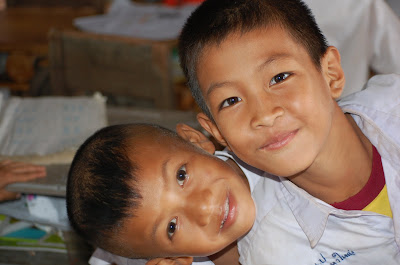
About a week and 200 pages later, (and about 30 pages worth of references- Pollan did his research) I realized that during my time here in Thailand, I had been performing all the food algorithms Pollan suggests in order to practice a sustainable way of eating as a part of a community and a resident being of this earth. The food culture in rural Thailand (I cannot say the same for Bangkok, where it is starting to desperately mirror a Western way of living, but that's another pedantic entry reserved for later) starkly contrasts the Western way of eating and living in so many dimensions, and the people here are in the better for it.
(A brief interjection: I am mindful of the stream of implications when I say "Western." By this, I mean an American way of living and its cultural exports. I am mindful also, that the "West" is not one giant cultural monolith-- it is a brief generalization for the sake of convenience.)
Living in Nakhon Phanom made me realize just how incredibly antiseptic life can be in America, and often to our detriment. Sometimes our food can be so incredibly processed by industry, that our relationship with nature gets lost, well, in the process. Here in Nakhon Phanom, the chicken you may be eating might easily be the one that woke you up that morning. Fresh meat and produce alight local open air markets. They don't travel very far to avoid the expense of refridgerated trucks. This inconvenience might easily be overcome in America, but for the locals, this is actually an advantage--products are bought locally, so the communities support each other, carbon footprints are reduced, and best of all, the food is absolutely fresh and their nutrients kept intact. Processed foods lie hidden in the backstage. Consumers here have a much closer relationship with nature; they are accountable to their land and are therefore responsible eaters.
Pollan explains that the longer food takes to prepare, the healthier it is. Here in rural Thailand, the production and consumption of food can easily become the centerpiece of every day. At my school, the students collectively prepare the food for lunch long before the first period starts. Because they don't have the same conveniences Americans enjoy (I haven't seen a microwave in a long time) every thing becomes a labor a love, to be savored by every one during the meal. I understand that modern conveniences are created for many purposes; I don't want to end up indicting the Western civilization. I just wanted to emphasize how enviable that locals here put such emphasis on meals. They might live simpler and more modest lives, but when it comes to gathering and eating, the meal isn't one more chore one has to fulfill. Food might be more scarce, but every mouthful is important. A good meal constitutes good company, family, congregation, and a close affiliation with nature. Concomitantly, good health follows good meals. What I've realized is, without all the convenience and glamour of Western technology, people here take better care of their health, and the earth.
In keeping with this philosophy (although the practice preceded the realization) my vegetarian roommate and I prepare our dinners every night from scratch. If we make black bean burgers, the beans are soaked overnight, boiled for hours the next day, mushed by a fork and driven by willpower, handpattied, and fried. Whew. But man, the first bite, dissolves all the bad things in the world and suddenly Republicans no longer exist. After eating like this for several months, I feel physically stronger. More importantly though, it gave me an incredible appreciation for good and real food and all the cooks in the world who subscribe to a real food philosophy. Bon Appetit.
Well, I have now made myself incredibly hungry and will saunter down to the kitchen. This week, school has been cancelled for me so my friends and I are going to Vientiane, Vang Vieng and Luang Prabang in Laos. Have a wonderful week everyone!

















